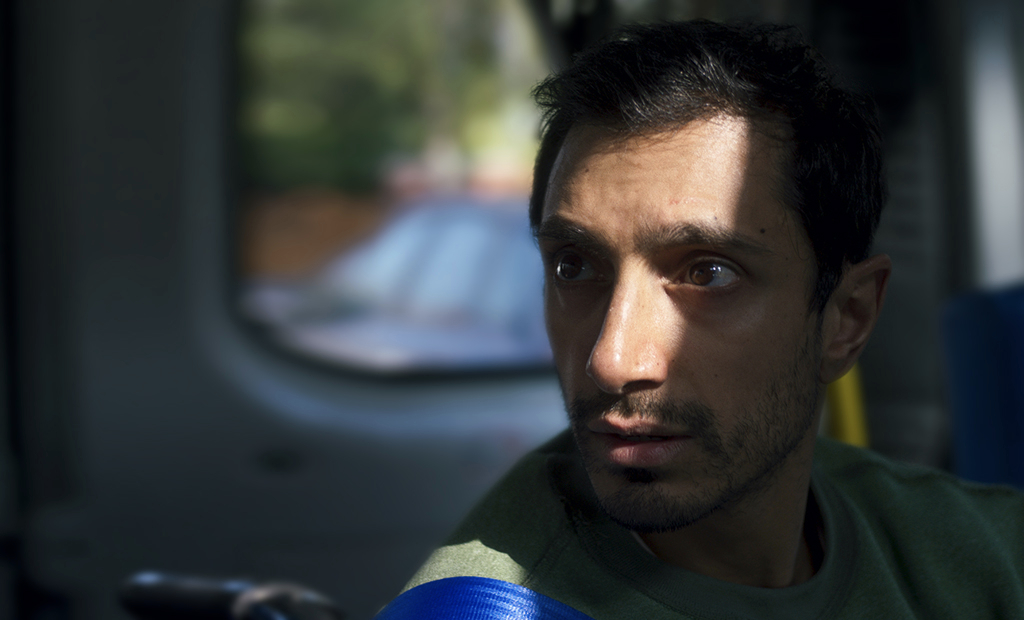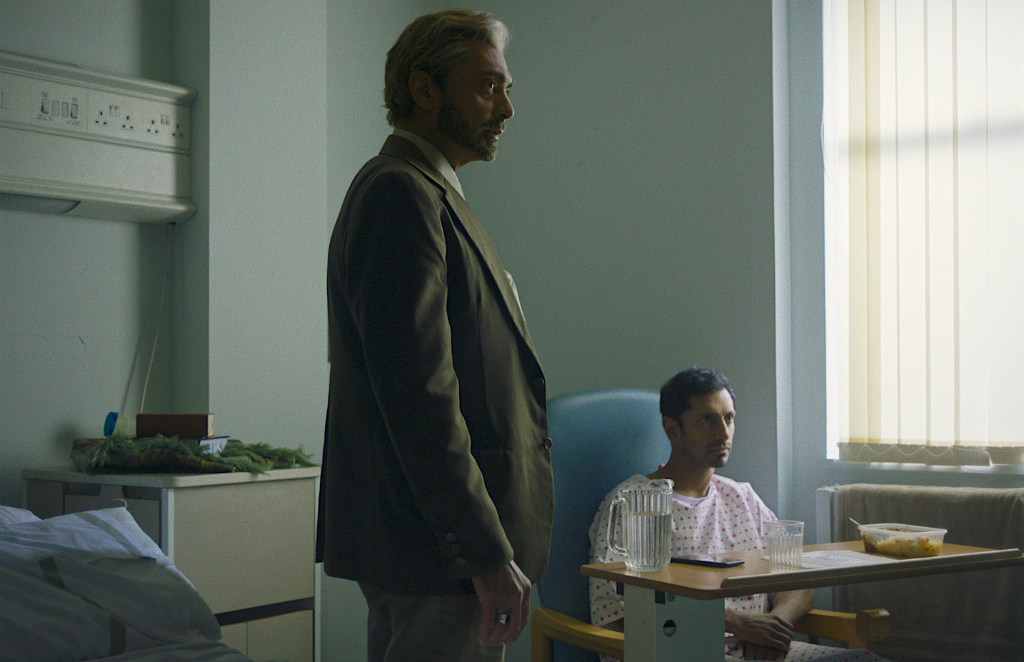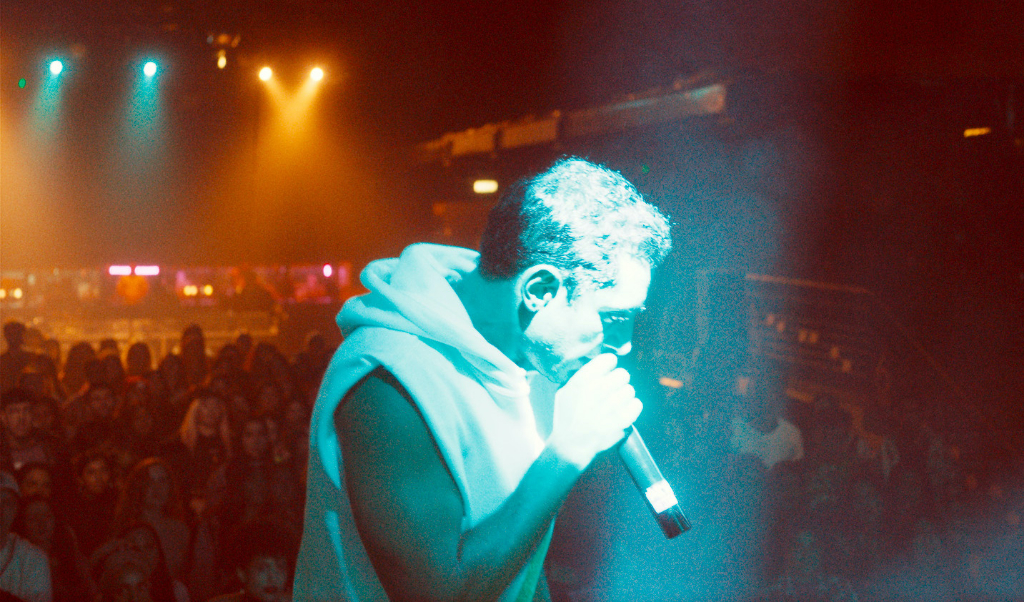Riz Ahmed and Bassam Tariq on Mogul Mowgli and the challenge of representing your own culture

Mogul Mowgli is the story of a fledgling British-Pakistani rapper (Riz Ahmed) with autoimmune disease. Debilitating and degenerative, the illness manifests itself in gradual muscle weakness. This is Bassam Tariq’s first fiction feature, which unveils the customs, tropes and dialects of British-Pakistani communities. We spoke with the director as well as Ahmed who co-wrote and produced the project.
You’re normally an actor, not a writer. In Mogul Mowgli you did both – how did the two things enrich one another?
Riz Ahmed: I think everything we do affects everything we do. Like the way we interact with our families affects the way we make our art and vice versa, and that’s kind of what we explore in this film – the idea that you can’t separate off different parts of your life, they all kind of bleed into each other, and often in unexpected ways. In the film what we’re looking at is this idea that when you’re seeking validation, seeking applause, seeking love from an external source like an audience, then that’s a kind of bottomless pit. You can always want more: when you come back from a great tour you want to go on another tour, and that can affect the way you interact with your family, because if you’re constantly seeking external validation you don’t know how to find that self love within.
Is that also your personal experience?
Bassam Tariq: I think what I would just add to that – I think what he said was great – is that when you’re a person of colour living like an immigrant, working class, there’s also this larger burden of representation. So if I tell you I’ve got two young kids and I’m saying “I’m doing this for us, I’m doing it for us.” Am I really doing it for us, or is it just that I also want to get away? Sometimes you don’t want to really face the music of the truth that’s really around.
How did the two of you meet? How did this project begin in the first place?
BT: I’ve actually been a fan of Riz’s music for a while and then when he was living in New York, he was doing The Night Of for HBO and I had just finished my first film These Birds Walk with a dear friend of mine Omar Mullick. And Omar had met Riz and was like “you gotta meet this guy.” And then I was like, “actually I’m kind of familiar with his work.” So he and I really hit it off and we did a trip to Pakistan, and there, when I saw him collaborating with some musicians, and I saw what a phenomenal lyricist he was and how he’s able to even perform in such an excellent way, I was like, “I want to bring this urgency to cinema. And whatever we do together” – like, I even wrote this [down] – “I want to do the artist’s journey through lyrics – I want to explore that and have the arc move through music.” So that was kind of the acceleration of this: it was really me pushing for more of the music, because I find him a phenomenal spoken word artist and rapper, and to see that performance of the word from rap that happens in the middle is one of the happiest moments of my life.
So are you really phenomenal?
RA: Am I really phenomenal? I couldn’t judge that, see the film and tell me yourself. Sorry, I’m a douche.
Where does the rapping come from?
RA: I always listened to cassettes that my brother had made, just being a hyperactive kid, finding some kind of template within African-American culture to turn [my] feelings of alienation into a form of self-expression and a pathway to respect and dignity. It’s, yeah, I think borrowing from that culture and that tradition to make sense of my own place in the world, from that really.
There was a film a couple of years ago, Viceroy’s House, about the partition of Pakistan, and in the press conference there was a discussion about how partition created a collective trauma on all Pakistani people, whether they are living in the country or migrants, and how it informs every part of their cultural identity. Do you feel that’s true, and if so, does it inform you as creatives?
RA: I think it has a collective trauma on all of us, whether we’re aware of it or not. Some people are just more keenly aware of it than others. Britain is enacting another partition in itself right now, you know. It’s happening right now politically. The story of slavery isn’t just an African-American story, the story of partition is not just a South Asian story, the story of the Holocaust is not just a Jewish story. These are stories about the human race and our failings and the lessons that we need to learn and the kind of trauma that is visited, yes, more keenly on some people in those stories than others, absolutely, you know some people are on the sharp end of the blade. But it is still a kind of trauma that reverberates throughout our societies. When you look at the repercussions of that through time, through socio economic marginalisation of those traumatised and oppressed people, the lack of a roadmap or template for them to find a way to dignity, the way that they might then slip into ideologies that are a danger to themselves and others – these things are connected, we’re all currently right now experiencing a post-colonial trauma. This is the blowback against the post-colonial blowback. That’s what’s going on in Europe right now. So really partition is a story we all need to be up on right now.
Do you still believe in the power of art, in our societies?
BT: The power of art. I believe in the power of cinema and of us all gathering in a space together, whether it’s a church or a mosque or whatever. A cinema is a collective gathering of people watching something and feeling something, it can do things that we don’t understand, and I think that this empathy gap that we have right now, it can help close some of that. So I do believe in the power of art.
And when you [Ahmed] perform as a musician, do you feel that you can still do something through that tool?
RA: Yeah, I think if I didn’t believe that then I would stop. But I often question whether I do believe it. It’s tricky, isn’t it? Crisis in faith is still a part of faith. I think it’s probably quite natural to question the efficacy of what you’re doing, even as you’re doing it. Maybe you continue to do it as an act of faith more than anything else. But maybe kind of having that faith in your heart – maybe that’s actually the thing that makes the real change. Be hopeful.
For you as a performer, when you play another performer – or in this case you play not yourself but maybe a version of yourself – how close to home is too close? Where do you draw the line when you develop a character or story?
RA: You tell me, if it feels too close I’ll put on a wig and an accent. I very rarely got to play characters like myself, that’s the thing. I very rarely play in my own accent, I very rarely play my own culture. Something I realised, actually not so long ago, was that the thing that doesn’t exist on screen and culture is characters like me, characters like Bassam. That’s actually the thing that’s not there, characters with that kind of complexity do not exist. So the way to dream them up is to offer yourself to the culture, to the story, to the script, and say: “Well, okay, let’s stretch culture by working with that.” So in a way it might seem like, on paper, saying all characters and actors playing themselves is slightly banal and unadventurous. And yet in the case of people like us – working-class, South Asian children of immigrants who belong to the Muslim diaspora – in this world right now, in this culture right now, it’s actually quite a radical act to play a version of yourself. Because the existence of people like us is controversial to some people.
Was it difficult to attract interest in terms of funding?
BT: People ask us that. We’ve been really blessed. Because of our existing relationship with other places, Cinereach was one of the first people to come on board the film. They had believed in me, in my other work, and when they found out that I was working with Riz, they were such huge fans of Riz, they were like: “Yes, we want to be on board.” So they came on board. Eva Yates from BBC Films was also super interested and she was like, “Yeah we’ll be on board.” And also it’s Pulse [Films], I would say that Thomas Benski’s championing of our film, his track record, and him really getting behind this at such an early place really helped make it happen. There was an amazing moment where it all just moved together really quickly.
Do you feel you [Ahmed] have any clout these days to get projects made?
RA: I don’t know if I feel like I’ve got clout? Maybe I should throw it around a bit. Maybe you’ve spotted something I haven’t. I should get a trailer.
BT: I’m gonna say something about it. What do I see, something that Riz brings – forgive me for interrupting – when I saw Four Lions and I saw something that I never saw anything like before in my life, I started to write and imagine strong brown characters after I met Riz. And that’s a fact. Because what he did was, he broadened my own imagination of our people. The scripts that I had written before would have brown characters in them, but there would be a white woman lead, or there would be this other thing, because I was always like, “Nah but a brown guy can’t act”. But then I see, no, this is possible, and then Riz takes my hand and goes, “Come here. Look in London and see all these other actors: Anjana Vasan, Nabhaan Rizwan, Hussain Manawer, Ali Khan, Sudha Bhuchar.” We brought all these people into our film because they can do this, they can can hold a film for 86 minutes, they can f***ing do it and that’s exciting. So yeah, he brings, if there’s a clout, it’s the broadening of the imagination which is so important for directors and for writers to see. Because these are our muse! Without people like Riz, then I’m gonna go back to documentary, because then I can relate more with my heart.
Would you say Riz has become your muse?
BT: Riz is everyone’s muse.
You said “my culture” – what is your culture now? Do you think it’s broadened out since you’ve been in the States working? What’s your sense of identity?
RA: It’s a mongrel culture and I’ve always been aware of that and always been in touch with the complexity of it, to be honest. And that’s kind of what the film explores, the complexity of contemporary multicultural identity. I feel like this film is an exploration of that and I wouldn’t say that at the end of it I understand myself any better. I’d say I accept myself a bit more and I think that’s what the film is about. Someone who’s trying to aspire to becoming a better version of themselves, a different version of themselves, a version that’s gone on a bigger tour, that’s more successful, that has more fans, that is not back home with his parents and even not “stuck” with his girlfriend. He’s existing in a plane of endless possibility and increasing success. And actually, through illness, through being closer to his own vulnerability, through facing his own lack of control – that we all have, you know, none of us control anything – through that he realises: “actually, do I accept myself as I am right now without the prospect of constantly being a different version of myself?” And so that is the journey of the character, one towards self-acceptance essentially, and I guess towards accepting the confusion.
Since when you made The Reluctant Fundamentalist would you say that things have changed, that there’s less racism in the world? Since you started working ten years ago have you noticed a shift?
RA: I couldn’t comment on that. It’s such a broad subject.
Within the casting realm for instance, are people more colourblind now?
RA: I don’t know. I feel like I’m bored of talking about it. I just want to be able to focus on making good work, trying to grow as an artist. There are all these obstacles but I think Joaquin [Phoenix] put it really well in a way: that’s not my issue, that’s the issue of all the people who’ve created those obstacles. To dismantle those obstacles or get left behind. So in a way I’m looking to outsource that s**t to the people who’ve created the problem. I’m just trying to create opportunities for myself to grow.
BT: What I see is there’s a train that’s moving and we’re on this train and it’s an exciting and beautiful broad train and everyone’s welcome on board, but it’s moving, so that’s it. It’s moving to a more accepting, pluralistic space and it’s happening. So I’m excited to be on that train and I want to be on that train.
Speaking of creating new opportunities for yourself, writing your own stories, does a film like this spoil you for other projects?
RA: It’s definitely a really special collaboration. Bassam really kind of pushed me to go to a more honest place, where maybe I haven’t been before on screen. I learned so much. He invited me to write on the film for the first time and that was a big learning curve as well, Bassam and I went down the road together. I think if you approach things the right way, hopefully everything is an opportunity to grow in some way, even some of those different kinds of movies that you’re talking about. The truth is every film is different. You go do some massive movies and they’re creatively like… they’re curveballs. So I just think that every job is different.
Oliver Johnston
Read our review of Mogul Mowgli here.
Read more reviews from our Berlin Film Festival 2020 coverage here.
For further information about the event visit the Berlin Film Festival website here.
























Facebook
Twitter
Instagram
YouTube
RSS